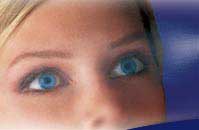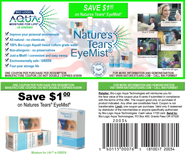
Dry Eye Syndrome among Women
Dr. Ilene Gipson of Harvard Talks with Sharon Kleyne
Guest: Ilene K. Gipson, Ph.D. (Boston, MA), Professor of Ophthalmology, Harvard Medical School.
Dr. Ilene Gipson is an ophthalmologist and dry eye syndrome researcher at Harvard Medical School. During the interview, she pointed out to Sharon Kleyne that dry eye syndrome is now the #1 reason for eye doctor visits in the United States. She explained that dry eye and eye dehydration are extremely complex. Dry eye syndrome involves the surface of the eye, tear and lipid producing glands, the skin of the eyelids, the manner in which inflammation is processed by the brain and body, hormone production, microscopic tear film components, the nervous system connection to the brain, water intake and natural water in air. Any part of this system can result in dry eye and dehydration symptoms.
Two-third of dry eye syndrome sufferers are women and a significant percentage are peri-menopausal or post-menopausal (although many men, including older men, are also subject to dry eye). The symptoms in women relate mostly to hormone levels and lifestyle. Dr. Gipson stresses that women do not get menopausal dry eye syndrome simply "because" they are women. Menopausal dry eye is not inevitable. Women are also more prone to autoimmune diseases, which has some of the same precipitating factors as dry eye. Women also live longer, increasing the risk of age related illness.
For natural eye health at any age, Dr. Gipson recommends dark green vegetables and adequate sleep at night. Sleeping naturally lowers the tear film pH and restores tear film moisture. It is also generally conducive to good health. She also recommends drinking adequate water.
Regarding computers, Dr. Ilene Gipson explains that deep concentration can substantially affect the eyes' blink rate. A slowed blink rate can cause dry eye symptoms by increasing natural moisture evaporation from the tear film. Indoor conditions such as household chemicals, insulated walls and windows and forced-air heating and cooling can also cause dry eye symptoms.
Sharon's Evaluation: Dr. Gipson is an exceptional woman with an important mission. I fully support her recommendations of education and proactive eye care through natural lifestyle habits and regular checkups. We both recommend taking care of your whole body because all parts are interconnected. We also should be concerned about the plight of women in some underdeveloped countries who spend hours each day carrying water for their children and families. Often, the water is unsanitary and they are prone to a wide range of dehydration diseases, including dry eye syndrome.
Website: www.womenseyehealth.org.
CONTACT:
Bio-Logic Aqua Research - Rogue Media Division.1-800-FOR-MIST (367-6478)
RogueMedia@biologicaquaresearch.com
www.sharonkleynehour.com
whatistheeye.wordpress.com
www.biologicqua.com









